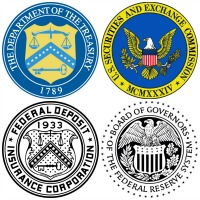The new EU regulatory capital regime came into force on 1 January 2014 and with it a recasting of the securitisation risk retention rules. To accompany these new rules, the European Banking Authority (EBA) published final draft regulatory technical standards …
The following remarks were delivered by Commissioner Daniel M. Gallagher of the U.S. Securities and Exchange Commission in Washington D.C. on January 15, 2014.
Thank you, Sarah [Kelsey, Exchequer Club Secretary], for that introduction. I’m very pleased to be here …
The high profile long-running saga between Mark Cuban — entrepreneur, television personality, and billionaire owner of the Dallas Mavericks — and the SEC has finally ended with Mr. Cuban emerging victorious. On October 16, 2013, after less than four hours …
Like children on Christmas Eve, securities defense attorneys and corporate executives are waiting in hopeful anticipation for the Supreme Court’s coming decision in Halliburton Co. v. Erica P. John Fund, Inc. (“Halliburton II”), which may overrule the “fraud on the market” doctrine (“FOTM”) that was announced over a quarter century ago in Basic v. Levinson.[1] Academics are divided, with probably the majority fearing the loss of general deterrence if the securities class action is substantially undercut. Conversely, a minority (including this author) believe it is remarkable that FOTM has survived as long as it has because it is extraordinarily ill-suited to the real world of securities fraud (as hereafter explained). A third more nervous group of spectators are the managing partners of litigation-oriented law firms, who know that FOTM’s potential abolition would likely imply a steep decline in securities litigation, which is the staple of their practice. Ironically, some of the securities defense attorneys eagerly awaiting FOTM’s demise may next year be learning how to litigate patent cases. Be careful then what you wish for, as you may get it.
In the latest instance of proxy advisors establishing a governance standard without offering evidence that it will improve corporate governance or corporate performance, ISS has adopted a new policy position that appears designed to chill board efforts to protect against …
As we have described in our prior memos (here and here), in Halliburton Co. v. Erica P. John Fund, Inc., No. 13-317, the Supreme Court will decide whether or not to abandon the “fraud on the market” …
The following is the SEC’s press release on the Volcker Rule revision regarding CDOs backed primarily by trust preferred securities, originally available here. The interim final rule and accompanying release is available here.
Five federal agencies on Tuesday …
The following comes to us from Peter Reilly, Associate Professor of Law, Texas A&M School of Law.
Wal-Mart is one of the wealthiest and most powerful companies in the world. And billionaire gambling magnate Sheldon Adelson is one of the …
In the wake of the 2008 crisis, it soon became apparent that the fault lines of the global financial system extended far beyond the regulated banking sector to the less regulated “shadow banking” sector. Nonbank financial entities including (but not …
The following comes to us from Bernard S. Sharfman, Visiting Assistant Professor of Law at Case Western Reserve University School of Law.
When should courts participate in determining if a corporate decision maximizes shareholder wealth? That is the question at …
The following comes to us from Scotland M. Duncan, an attorney at Jones Day in Pittsburgh, PA.*
It is axiomatic that calculating the amount of loss within securities fraud cases is essential to criminal sentencing. Until about a year …
On December 20, 2013, the Securities and Exchange Commission released a report, required by Section 108 of the JOBS Act, that reviews the disclosure requirements in Regulation S-K. The report summarizes the Commission’s prior initiatives, reviews the current disclosure requirements, …
The following is the SEC’s press release and fact sheet, originally published here. The proposed regulation is available here and the video of the SEC’s open meeting is available here.
The Securities and Exchange Commission today voted to …
The following comes to us from Tao Li, Assistant Professor, Warwick Business School
Proxy advisors, private firms that help investors decide how to vote their shares, play an extremely powerful role in shaping corporate governance. As institutional investors vote billions …
On Monday, December 16th, Morrison Foerster released what may be a first-of-its-kind regulatory reform glossary. The glossary, which is not comprehensive, is intended to serve as a helpful summary of neologisms and other acronyms (e.g., SIFI), nicknames (e.g., repo), and …
Hedge funds’ distressed and default debt investments in the United States have increased dramatically in the last two decades (from around $70 billion in 1998 to around $867 billion in 2007) and hedge funds with strategies that focus on distressed …
In the late 1980s, large financial institutions successfully marketed a new exemption in the tax code authorizing the perpetual insulation of wealth from federal transfer taxes. Specifically, the 1986 tax code reforms included an exemption from the federal Generation Skipping …
The following is the SEC’s press release and fact sheet on the adoption of the Volcker Rule, originally available here. The adopting release and text of the final rule is available here. Public statements from each of the …
The following post is based on a memo originally published by Cadwalader, Wickersham & Taft LLP on November 14, 2013 which can be found here.
Two recent Delaware Chancery Court opinions, issued on October 25 and November 9, 2013, …
In an article to be published this Spring in the DePaul Law Review, I argue that Delaware’s position as the center of corporate litigation has been rooted in two unique but unconstitutional approaches to personal jurisdiction over fiduciaries. Until Delaware …
 Sky Blog
Sky Blog













